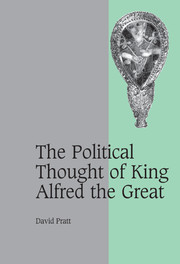Book contents
- Frontmatter
- Contents
- Acknowledgements
- List of abbreviations
- Note on citations
- Chapter 1 INTRODUCTION
- Part I The West Saxon Political Order
- Part II Alfredian Discourse and its Efficacy
- Chapter 7 THE FIELD OF ALFREDIAN KNOWLEDGE
- Chapter 8 THE CONSTRUCTION OF ALFREDIAN DISCOURSE
- Chapter 9 ALFREDIAN TECHNOLOGY: BOOKS AND ÆDIFICIA
- Chapter 10 THE HIERDEBOC AS A TREATISE OF POWER
- Chapter 11 THE DOMBOC AS A REORIENTATION OF ROYAL LAW
- Chapter 12 TRIBULATION AND TRIUMPH IN THE FIRST FIFTY PSALMS
- Chapter 13 THE SEARCH FOR A SATISFACTORY CONSOLATION
- Chapter 14 SEEING GOD AS HE IS
- Chapter 15 CONCLUSION
- Appendix: West Frankish deployment of Solomon's dream
- Bibliography
- Index of manuscripts
- General index
- Cambridge Studies in Medieval Life and Thought Fourth Series
Chapter 7 - THE FIELD OF ALFREDIAN KNOWLEDGE
Published online by Cambridge University Press: 06 July 2009
- Frontmatter
- Contents
- Acknowledgements
- List of abbreviations
- Note on citations
- Chapter 1 INTRODUCTION
- Part I The West Saxon Political Order
- Part II Alfredian Discourse and its Efficacy
- Chapter 7 THE FIELD OF ALFREDIAN KNOWLEDGE
- Chapter 8 THE CONSTRUCTION OF ALFREDIAN DISCOURSE
- Chapter 9 ALFREDIAN TECHNOLOGY: BOOKS AND ÆDIFICIA
- Chapter 10 THE HIERDEBOC AS A TREATISE OF POWER
- Chapter 11 THE DOMBOC AS A REORIENTATION OF ROYAL LAW
- Chapter 12 TRIBULATION AND TRIUMPH IN THE FIRST FIFTY PSALMS
- Chapter 13 THE SEARCH FOR A SATISFACTORY CONSOLATION
- Chapter 14 SEEING GOD AS HE IS
- Chapter 15 CONCLUSION
- Appendix: West Frankish deployment of Solomon's dream
- Bibliography
- Index of manuscripts
- General index
- Cambridge Studies in Medieval Life and Thought Fourth Series
Summary
Part II offers a full exploration of Alfredian royal learning. It begins by establishing its context in educational delivery and ruling discourse; it then moves to situate its role in the complex dynamics of Alfredian power, as the basis for analysis of individual texts. This chapter is concerned with the overall scope of learned innovation, against the backdrop of existing West Saxon practices. As ever, such questions gain much from awareness of parallel structures in the Carolingian world, accentuating the full significance of Alfredian developments in a European context.
ALFREDIAN INNOVATION: ALFREDIAN WISDOM AND THE SHIFT TO VERNACULAR PROSE
Much Alfredian material owes its existence to what has commonly been termed Alfred's ‘educational programme’, though its scope was not so limited. In effect this amounted to a reorientation of aristocratic education, towards a model placing special weight on the reading of vernacular texts, principally in the form of prose. Texts were mainly translations from Latin originals; reading was serviced by provision of literate instruction. The acquisition of literacy provided access to ‘wisdom’; the entire scheme could be presented as a revival, reversing sapiential decline.
Dominating all was the role accorded to Alfred, in an extraordinary array of king-centred evidence. There are many early medieval examples of learned kingship: striking is the inclusion of authorship among royal activities, beyond patronage, reception and consumption. This places Alfred among a much smaller body of rulers identified as the actual authors of texts; each raises very interesting questions of the processes lying behind such production.
- Type
- Chapter
- Information
- The Political Thought of King Alfred the Great , pp. 115 - 129Publisher: Cambridge University PressPrint publication year: 2007

